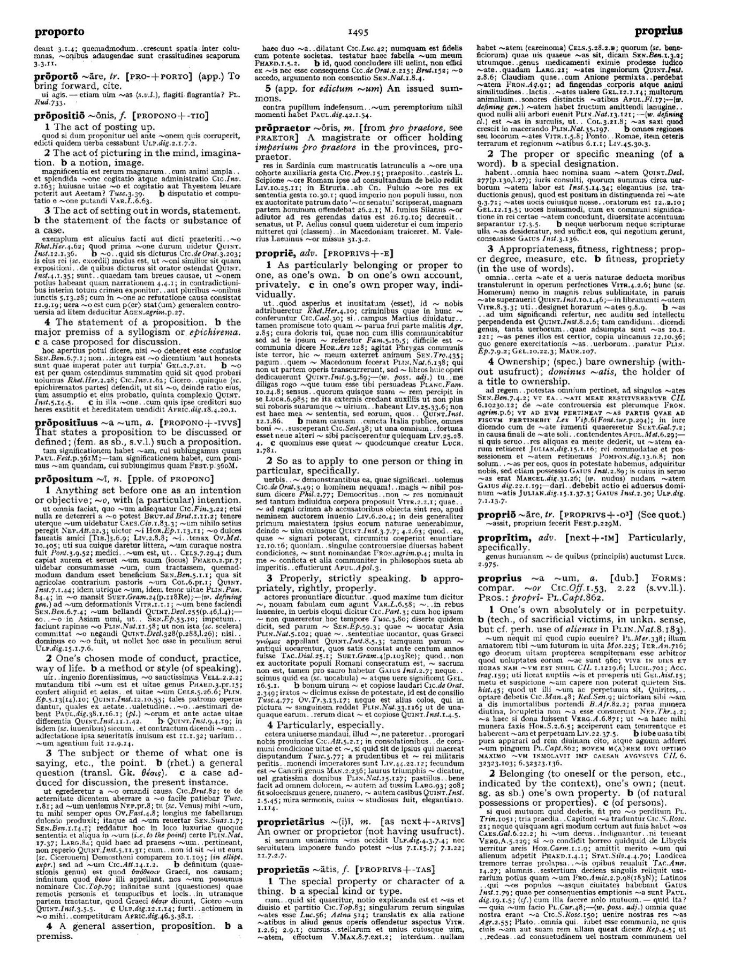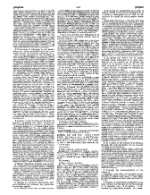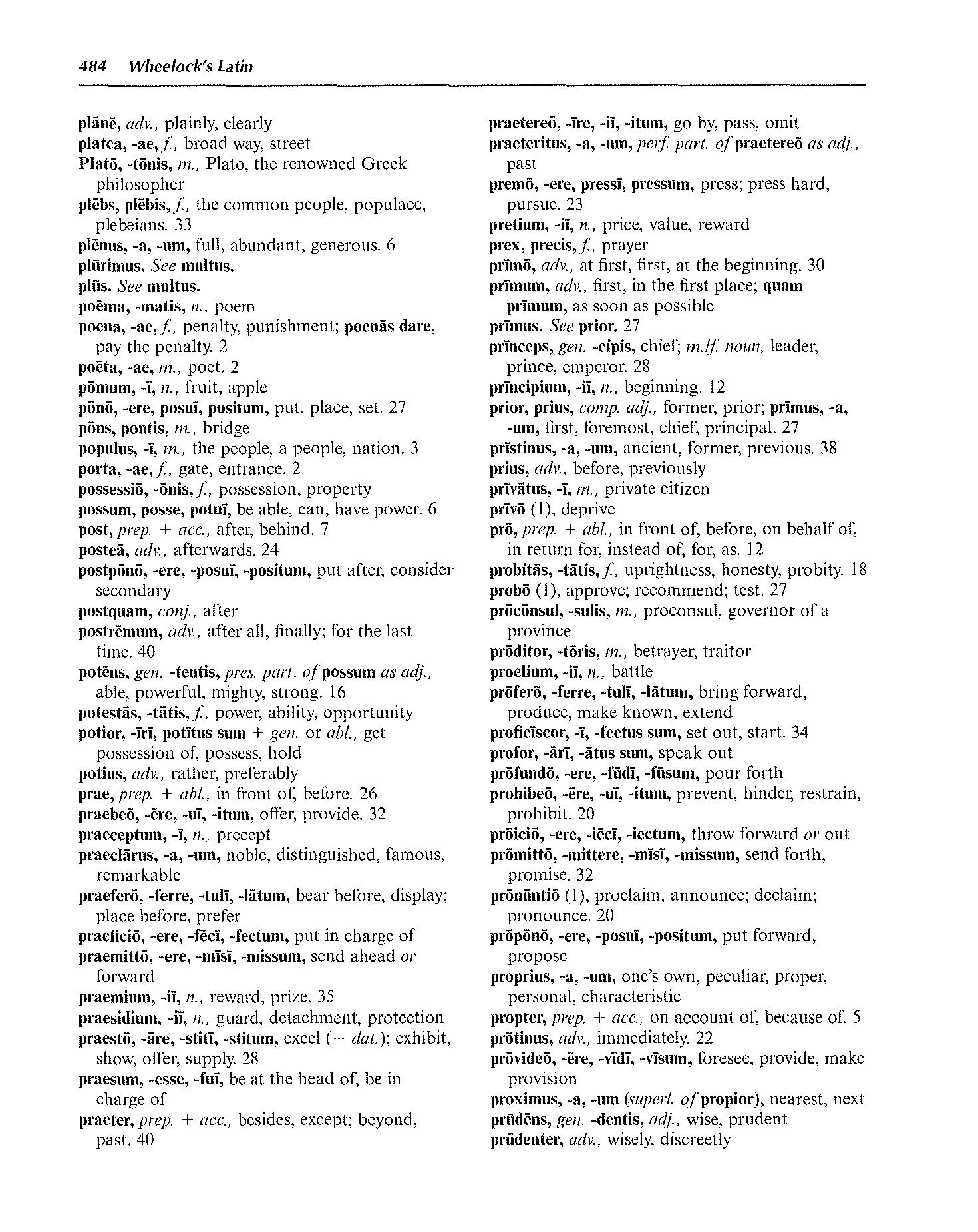
page_listing.tpl
page_subListingDetails.tpl
sub_listingDetails_style1.tpl
sub_listingDetails.title.tpl
proprius one's own
proprius is a Latin Adjective that primarily means one's own.
Definitions for proprius
Wheelock's Latin
Adjective
- 1
one's own, peculiar, proper, personal, characteristic
Oxford Latin Dictionary
Adjective
- 1
One's own absolutely or in perpetuity. (b) (tech., of sacrificial victims, in unkn. sense, but cf. perh. use of alienus in PLIN. Nat,8.183).
- 2
Belonging (to oneself or the person, etc., indicated by the context), one's own; (neut. sg. as sb.) one's own property. (b) (of natural possessions or properties). (c) (of persons).
- 3
Concerning or belonging to one person, thing, etc., alone, exclusively one's own, personal private. (b) (of actions, attitudes, etc.).
- 4
(a) (pred., w. inf. or noun cl.) Peculiar (to someone, something, etc., that). (b) (neut. as sb.) a special feature or property, peculiarity,
- 5
Rightly belonging, suitable, appropriate.
Sentences with proprius
Latin to English
Aliae nationes servitutem pati possunt, populi Romani est propria libertas.Compare Other nations may be able to put up with slavery, but freedom is the distinguishing attribute of the Roman people.
Felix, qui propriis aevum transegit in arvis, ipsa domus puerum quem videt, ipsa senem; qui baculo nitens in qua reptavit harena unius numerat saecula longa casae.Compare Happy the man who his whole time doth bound within the enclosure of his little ground. Happy the man whom the same humble place, the hereditary cottage of his race, from his first rising infancy has known. (Tr. Abraham Cowley)
Nullus est in res publica causa meus proprius; tempus vero ago sum magis ego proprius quam ceteriCompare There is no interest in the republic exclusively my own; but the time of action belonged more peculiarly to me than to the rest.
Hic studium non sum communis Graecia, sed proprius Athenae.Compare This study was not common to Greece, but peculiar to Athens.
Fecisti patriam diversis gentibus unam; profuit iniustis te dominante capi; dumque offers victis proprii consortia iuris, Urbem fecisti, quod prius orbis erat. (Rutilius Namatianus, On His Return I.62-66)Compare O Rome, the world is yours and you its queen. Far distant tribes become one fatherland beneath your power, which brought to conquered men the rule of law and through this common right, you made a city out of all the world.
Proprium humani ingenii est odisse quem laeseris.Compare It is human nature to hate the man whom you have injured.
Quid esse potest in otio aut iucundius, aut magis proprium humanitatis, quam sermo facetus ac nulla in res rudis?Compare What in hours of ease can be a pleasanter thing or one more characteristic of culture, than discourse that us graceful and nowhere uninstructed?
Inexcusabilis est omnis peccator vel reatu originis vel additamento etiam propriae voluntatis, sive qui novit sive qui ignorat, sive qui iudicat sive qui non iudicat; quia et ipsa ignorantia in iis, qui intelligere noluerunt, sine dubitatione peccatum est, in iis autem qui non potuerunt, poena peccati.Compare Every sinner is inexcusable, whether because of the original sin or because of an additional offense due to his own will, whether he knows or does not know it, whether he condemns or does not condemn it; because in those unwilling to understand ignorance itself is beyond doubt a sin, and in those unable to understand, this inability is the penalty of sin.
Declension table for proprius
Cactus2000
| Singular | Plural | |
| Nom. | proprius | propriī |
| Gen. | propriī | propriōrum |
| Dat. | propriō | propriīs |
| Acc. | proprium | propriōs |
| Voc. | proprie | propriī |
| Abl. | propriō | propriīs |
Data sources
Notes
- Definitions
- Frederick M. Wheelock, Wheelock's Latin, 6th ed., rev. Richard A. LaFleur (New York, NY: HarperCollins Publishers, 2005): 484.
- P. G. W. Glare, Oxford Latin Dictionary, Vols. 1-8 (Oxford: Clarendon Press, 1982): 1495.
- Word frequencies
- Christopher Francese, "Latin Core Vocabulary," Dickinson College Commentaries, last modified 2014, http://dcc.dickinson.edu.
- Paul B. Diederich, The Frequency of Latin Words and Their Endings, PhD diss., (Columbia University, 1939).
- Louis Delatte, Suzanne Govaerts, Joseph Denooz, and Etienne Evrard, Dictionnaire fréquentiel et index inverse de la langue latine [Frequency Dictionary and Inverse Index of the Latin Language] (Liège, Belgium: Laboratoire d'analyse statistique des langues anciennes de l'Université de Liège [L.A.S.L.A.], 1981): 125.
Bibliography
Allen, Joseph H. Allen and Greenough's New Latin Grammar for Schools and Colleges: Founded on Comparative Grammar. Edited by James B. Greenough, George L. Kittredge, Albert A. Howard, and Benjamin L. D'Ooge. Boston, MA: Ginn & Company, 1903.
Crystal, David. A Dictionary of Linguistics and Phonetics. 6th ed. Oxford, UK: Blackwell Publishing, 2008.
Delatte, Louis, Suzanne Govaerts, Joseph Denooz, and Etienne Evrard. Dictionnaire fréquentiel et index inverse de la langue latine [Frequency Dictionary and Inverse Index of the Latin Language]. Liège, Belgium: Laboratoire d'analyse statistique des langues anciennes de l'Université de Liège (L.A.S.L.A.), 1981.
Diederich, Paul B. The Frequency of Latin Words and Their Endings. PhD diss., Columbia University, 1939.
Francese, Christopher. "Latin Core Vocabulary." Dickinson College Commentaries. Last modified 2014. http://dcc.dickinson.edu/latin-vocabulary-list.
Gildersleeve, Basil L., and Gonzales Lodge. Gildersleeve's Latin Grammar: Third Edition, Revised, and Enlarged. 3rd ed. London, England: Macmillan and Co., 1903.
Glare, Peter G.W. Oxford Latin Dictionary. Vols. 1-8. Oxford, England: Clarendon Press, 1982.
Krüger, Bernd. "Latin Conjugation Tables." Cactus2000. Accessed May 5, 2023. https://latin.cactus2000.de/index.en.php.
Pierson, Nick. "Sound of Text." Accessed October 26, 2019. https://soundoftext.com.
Wheelock, Frederick M. Wheelock's Latin. 6th ed. Revised by Richard A. LaFleur. New York, NY: HarperCollins Publishers, 2005.
Wiktionary Contributors. "Victionarium." Wikimedia Foundation, Inc. Updated March 18, 2019. https://la.wiktionary.org/wiki/Victionarium:Pagina_prima.
Citation
Chicago (17th ed.)
Allo Contributors. "proprius, propria, proprium (adj.) - Latin Word Definition." Allo Latin Dictionary. Last modified . Accessed February 23, 2026. http://ancientlanguages.org/latin/dictionary/proprius-propria-proprium.
Entry created on . Last updated on .








